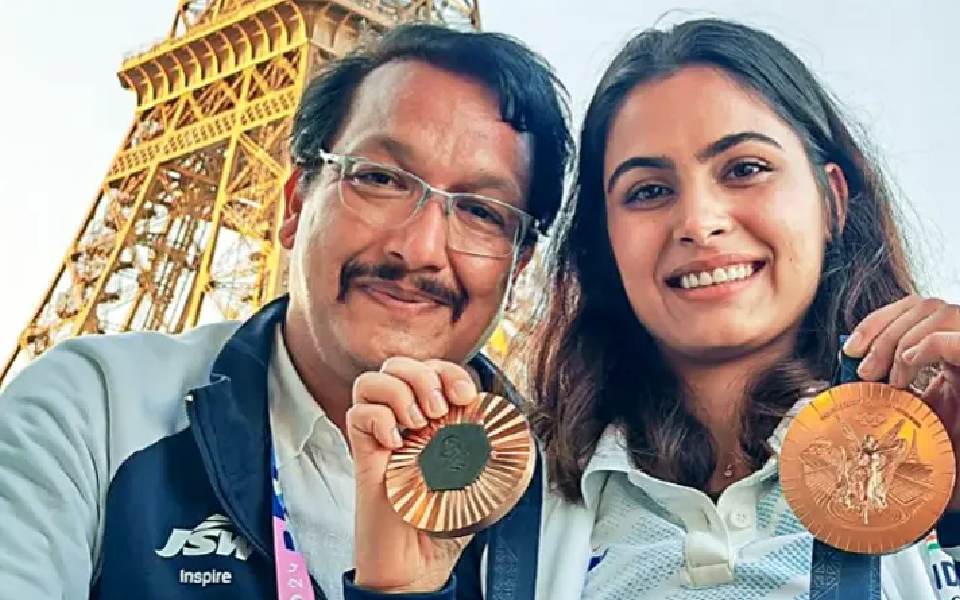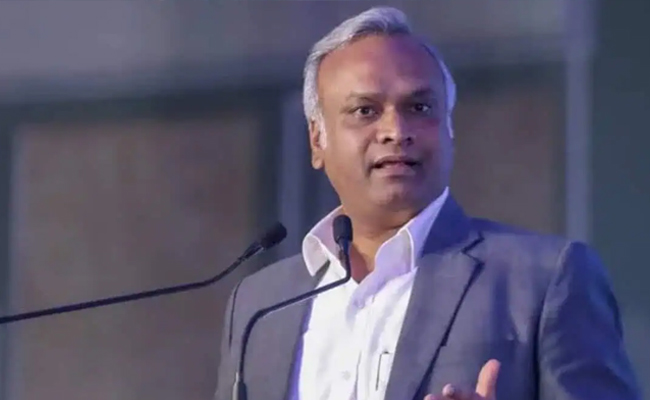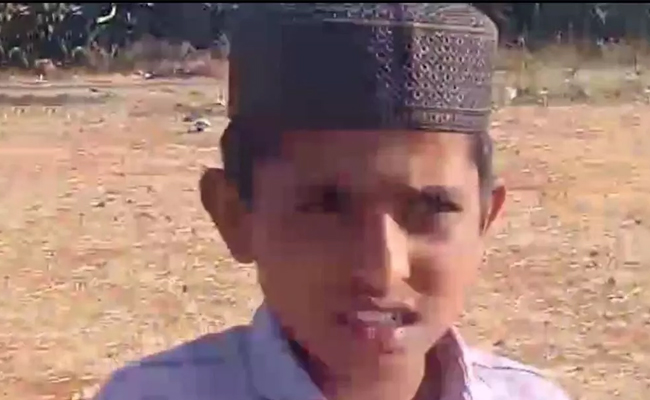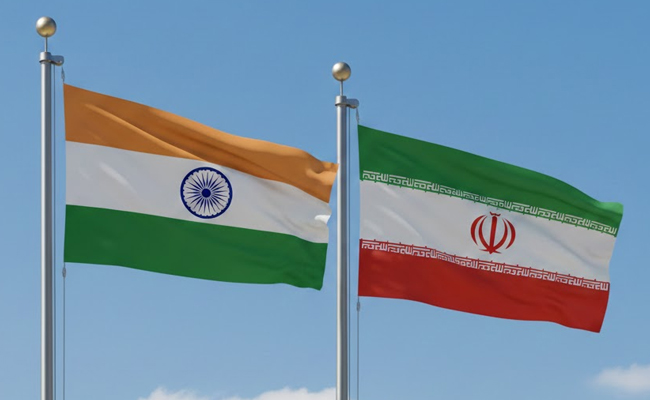New Delhi, Dec 24: Double Olympic medallist shooter Manu Bhaker's coach Jaspal Rana on Tuesday castigated the Sports Ministry, Sports Authority of India and the National Rifle Association of India, holding them responsible for "ignoring" his ward's credentials for the Dhyan Chand Khel Ratna award.
The champion shooter's omission has sparked a controversy even though ministry sources have asserted that the names are yet to be finalised and her name will be there when the final list is released in a week's time.
In August, Bhaker became independent India's first athlete to win two medals in a single edition of the Olympics with her bronze-winning show in the 10m air pistol individual and 10m air pistol mixed team events.
"I will hold all of them responsible. How can anyone even say Manu did not apply? She made history by becoming the first Indian to win two Olympic medals in the same Olympics. Her name should have been there automatically. Don't the people at the helm know who Manu Bhaker is and what are her credentials? This humiliation might just affect her progress," Rana, who was the personal coach of Manu when she won the medals at the Paris Games, told PTI.
"I can say that a wrong precedent is being set. Things like this can destroy an athlete's confidence."
Reports of her omission from the national honours evoked shock with her family insisting that application was duly submitted.
"If this can shock the sports fraternity, if you are speaking to me regarding this, if people are writing about this, then how come the committee that decides the names fail to understand that she deserves the honour," Rana asked.
"What is their job otherwise. Isn't it to go through the performance of the athletes over the last cycle and then arrive at a conclusion and recommend the names. According to me this is not a mistake and this is not an oversight," Rana said.
The award selection committee is a 12-member panel headed by retired Supreme Court judge Justice V Ramasubramam. It includes former athletes like women's hockey captain Rani Rampal among others.
The ministry norms allow athletes to self-nominate instead of relying on federations and other institutions for it. The selection committee is, however, allowed to consider names which may not be among the applicants.
While the ministry claimed that Bhaker did not apply for the award, her father Ram Kishan Bhaker, a chief engineer in Merchant Navy, said the youngster had followed the due process.
Rana added, "Even if the athlete was not able to apply for the award for some reasons, what is stopping the committee from recommending names. Hasn't she done enough to deserve an award."
"Anyway, it is not the first time. It has happened with me too. I have never received the Khel Ratna award," said the shooter who won three gold medals and equalled the world record in 25m centre fire pistol at the 2006 Asian Games in Doha.
"It's really appalling. Why should a top sportsperson apply or request for an award? Awards should come naturally and automatically. How can it be ignored? There has to be some system in place," Rana observed.
"Does every athlete know how to apply? Does it make sense that only an athlete can apply? Why not the federation, Sports Authority of India (or the) ministry," the coach asked.
A ministry source had earlier told PTI that Sports Minister Mansukh Mandaviya will decide on the recommendations of the 12-member award selection committee and, in all likelihood, Manu's name will be there in the final list.
"There is no final list of nominees at this point. Sports Minister Mansukh Mandaviya will decide on the recommendations in a day or two and her name, in all likelihood, will be there in the final list," the source said.
The legendary Rana returned as Bhaker's coach exactly one year before the Paris Olympics, and was by her side as she went on to create history in the French capital.
Under Rana's guidance, Bhaker enjoyed a fruitful period between 2018 and 2021, during which she won multiple ISSF World Cup medals and became a Commonwealth Games champion at Gold Coast 2018.
However, the two parted ways in 2021 ahead of the Tokyo 2020 Olympics in which Bhaker would go on to endure a disastrous outing while suffering a pistol malfunction.
Let the Truth be known. If you read VB and like VB, please be a VB Supporter and Help us deliver the Truth to one and all.
Bengaluru (PTI): Karnataka's BioEconomy has reached USD 39.2 billion in 2025, marking strong growth from previous years and reaffirming the state's leadership position nationally, according to an official report released on Monday.
The Karnataka Innovation and Technology Society (KITS), under the Department of Electronics, IT, Biotechnology and Science & Technology, unveiled the Karnataka BioEconomy Report 2025 in collaboration with the Association of Biotechnology Led Enterprises.
The report that was released by IT Minister Priyank Kharge stated that the state contributes around 21 per cent of India's BioEconomy and accounts for over 10 per cent of Karnataka's GSDP.
ALSO READ: Ethnographic study suggests political, economic support measures for Nadaf, Pinjara communities
According to the report, the BioEconomy has expanded from USD 31.0 billion in 2023, reflecting 26.5 per cent cumulative growth, and is now adding nearly USD 10 billion every quarter to the state's GDP.
BioPharma remains the anchor with over 40 per cent share (about USD 16.44 billion), driven by biologics, biosimilars, vaccines and diagnostics, it said.
"BioIndustrial biotechnology has emerged as the fastest-growing segment (about USD 11.46 billion, around 29 per cent share), led by fermentation-based industries, biofuels, enzymes and sustainable materials," the report stated.
BioServices accounts for about 25.8 per cent share, while BioAgri contributes to sustainable agriculture and input innovation, it added.
The report said BioEconomy growth is becoming increasingly multi-regional. While Bengaluru Urban accounts for about 54 per cent of the state's BioEconomy, Mysuru contributes around 8.7 per cent, while Belagavi and Dakshina Kannada together account for over 9 per cent. Northern districts remain the Agri-biotechnology belt.
As many as 218 new biotech startups were added in 2025, taking the cumulative total to 1,451 startups, with over 75 per cent focused on life sciences and health-tech. Bengaluru accounts for about 54 per cent of startups, it stated.
Between January 2024 and October 2025, the report stated that Karnataka attracted USD 1.14 billion across around 40 deals spanning BioPharma, MedTech, precision fermentation, digital health and AgriBio.
Minister Kharge said, "With our BioEconomy crossing USD 39 billion and contributing over 10 per cent to our GSDP, biotechnology is no longer confined to laboratories - it is now a central driver of economic growth, industrial innovation and societal impact."
He said that the state government's focus is on building a full-spectrum biomanufacturing economy by supporting deep-tech startups, strengthening innovation infrastructure, and ensuring that growth reaches beyond Bengaluru to every region of the state.





